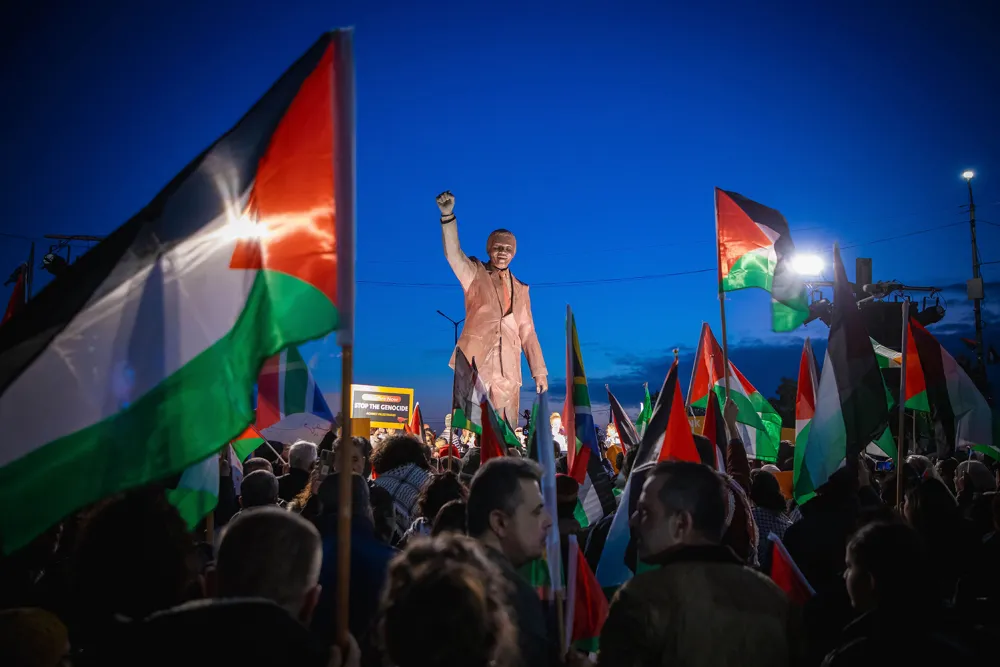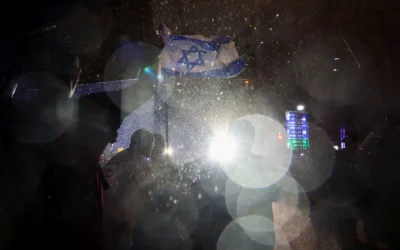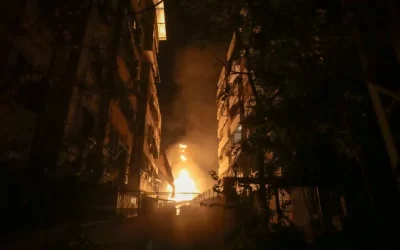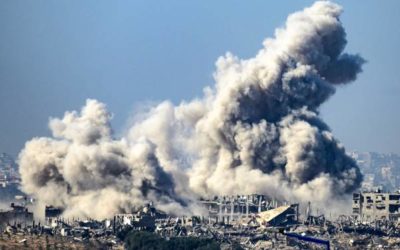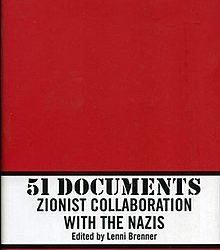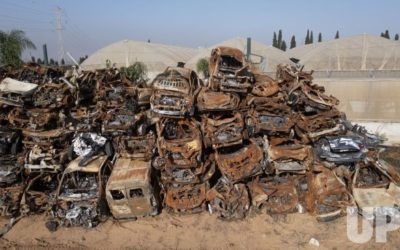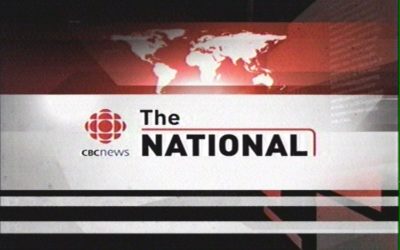Namibia and Bangladesh are the most vocal of many countries backing South Africa’s legal challenge to Israel
(*Note that certain phrases have been placed in Bold by PAJU)
Namibia Backs South Africa’s ICJ Case
Namibia has issued a statement in support of South Africa’s genocide case against Israel at the International Court of Justice (ICJ), including a scathing criticism of Germany’s decision to intervene in defense of Israel.
Namibian President Hage Geingob said on Saturday that Germany could not “morally express commitment to the United Nations Convention against genocide, including atonement for the genocide in Namibia, whilst supporting the equivalent of a holocaust and genocide in Gaza.” Berlin has not responded yet.
The German government said on Jan. 12 that the accusation of genocide against Israel had “no basis” and amounted to a “political instrumentalization” of the convention. “In view of Germany’s history and the crime against humanity of the [Holocaust], the Federal Government sees itself as particularly committed to the Convention against Genocide,” it said.
The Namibian presidency said in response that “no peace-loving human being can ignore the carnage waged against Palestinians in Gaza” and slammed Germany’s “inability to draw lessons from its horrific history.”
About 80 percent of the Herero population and 50 percent of the Nama population in German South West Africa, now Namibia, were killed between 1904 and 1908 after German soldiers drove them into the desert and sealed off watering holes to stop survivors from returning. The majority died in concentration camps that were a precursor to the methods used in the Holocaust.
In what historians describe as the first genocide of the 20th century, Namibians resisting colonization were placed in concentration camps and a death camp known as Shark Island—a prototype for Auschwitz—in which Indigenous people and children born from the rape of imprisoned women by German soldiers were gruesomely experimented on to prove racial inferiority. About 65,000 Herero and 10,000 Nama were massacred. The severed heads of Namibian prisoners were sent back to Germany for research, and native Africans were put on display in human zoos. Hermann Wilhelm Göring, the son of the colony’s governor, Heinrich Göring, became one of Adolf Hitler’s most notorious military leaders.
Beyond Africa, Bangladesh—another nation born amid genocidal violence—said in a statement released Sunday that it would intervene as a third party in defense of South Africa’s case. It is the only nation so far to announce it will do so. Bangladesh’s Ministry of Foreign Affairs said it “stands in support of South Africa’s application” against Israel’s “blatant disregard for and violation of international law” and “welcomes the opportunity to file a declaration of intervention in the proceedings in due course.”
The fact that South Africa has brought the case—and that the United States has reflexively opposed it—has further diminished U.S. credibility among Africans and shattered the notion that Washington stands for a rules-based order. Many nations in the so-called global south perceive blatant hypocrisy in Europe and the United States’ condemnation of an illegal occupation in Ukraine while continuing to staunchly back Israel despite the rising death toll in Gaza and settler violence in the Israeli-occupied West Bank. “When you are on the wrong side of the U.N. secretary-general … you are dismantling your house with the very tools that built it,” wrote Nesrine Malik in the Guardian.
South Africa has asked the ICJ to take provisional emergency measures to immediately suspend Israel’s military operations in Gaza and “take all reasonable measures” to prevent genocide. Israeli Prime Minister Benjamin Netanyahu has remained defiant. “No one will stop us, not The Hague, not the [Iranian-led] axis of evil and not anyone else,” he said Saturday.
South Africa’s governing African National Congress (ANC) party has long viewed the Palestinian cause through the lens of its own anti-apartheid struggle and has for years described Israel’s policies in the occupied Palestinian territories as a form of apartheid. The ANC also has historical reasons to resent the Israeli government and military. Israel secretly supplied weapons to South Africa’s apartheid regime, despite a U.N. arms embargo; leading Israeli generals advised South Africa’s military; and the two countries cooperated on highly sensitive nuclear and missile programs.
After his release from prison, Nelson Mandela forged a relationship with Yasser Arafat’s Palestine Liberation Organization, which had supported the ANC’s fight against apartheid while Israel was bolstering the white minority regime. Even if Pretoria does not win at the ICJ, South Africans largely appear to support their government’s case against Israel, as do the leaders of many nations in the Middle East, Africa, and Latin America.
Pretoria presented its case last Thursday under the 1948 Genocide Convention. Pretoria “unequivocally” condemned the atrocities committed by Hamas on Oct. 7 but argued no attack justifies the scale of Israel’s offensive in Gaza inflicting on Palestinians “conditions of life calculated to bring about their physical destruction” as a group.
Pretoria argued Israel’s assault on Gaza had a “genocidal intent” and presented 20 minutes’ worth of statements made by top Israeli officials, including Netanyahu’s comparison of Palestinians to the biblical story of the Amalek nation, which God ordered the Israelites to destroy. The court heard that a deputy speaker of Israel’s parliament called “for the erasure of the Gaza Strip from the face of the earth.”
In its occupation, “Israel for years has regarded itself as beyond and above the law,” one of South Africa’s lawyers, Max Du Plessis, told the court.
Israel, in its response, asked the court to dismiss the case, insisting that it is acting within its right to defend itself against Hamas after the group and its allies killed 1,200 people and took more than 240 hostage. “The appalling suffering of civilians, both Israeli and Palestinian, is first and foremost the result of Hamas’s strategy,” said Israeli legal advisor Tal Becker.
Israel’s lawyers rejected the suggestion that the comments made by Netanyahu and other senior officials proved that Israel had genocidal intent and said the statements did not reflect official government policy. “Some of the comments to which South Africa refers are clearly rhetorical, made in the immediate aftermath of an event which severely traumatized Israel,” said Malcolm Shaw, a member of Israel’s legal team. In order for South Africa to win the case, it has to prove direct and public incitement to commit genocide. Pretoria’s lawyers argued that incitement filtered down from government officials to Israeli soldiers.
The war has, in just over three months, killed 1 percent of Gaza’s population—nearly 24,000 people, including more than 10,000 children. A further 7,000 are reportedly still under rubble, and around 1.9 million people—more than 80 percent of Gaza’s population—have been displaced, according to the United Nations.
Human Rights Watch said it had documented the crime of starvation being used as a weapon of war in Gaza through Israel’s blockade of the strip. In its annual global report, the nongovernmental organization highlighted the “double standards” of governments silent on “Israeli violations of international humanitarian law in Gaza.”
The ICJ is likely to announce an interim measure in the coming days, but a final verdict could take years.
By Nosmot Gbadamosi, a multimedia journalist and the writer of Foreign Policy’s weekly Africa Brief. January 17, 2024
